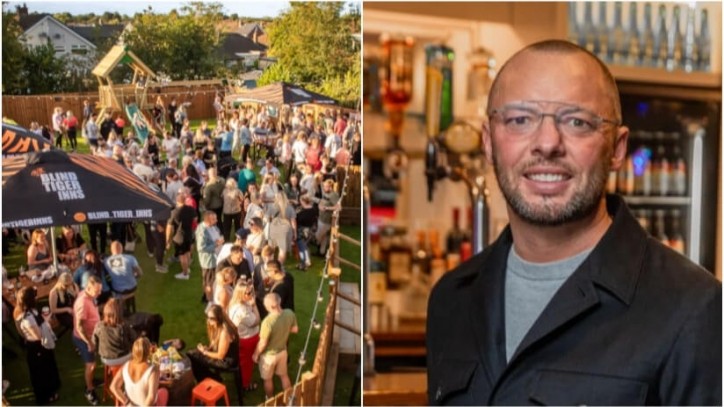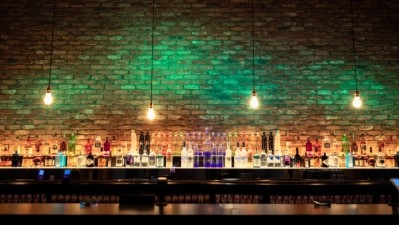Business profile: Blind Tiger Inns

- Are you a multiple operator? You need to be part of The MA Leaders Club, which meets three times a year for a day of business-focused presentations from top experts and owner/operators followed by an evening study tour of new and exciting venues. If you’re interested in joining and attending this stellar event, sign up here.
Our estate comprises a mix of community and high street venues, predominantly leased from pub operating companies.
Blind Tiger Inns facts 'n' stats:
Number of sites: 20
Number of employees: 220
Location: North-west England
Year the business started: 2017
The group is seven years old and has grown consistently over this time, through the acquisition of additional sites during every year of operating, combined with above average investments in the existing estate.
The success comes from being a small team, concentrating on a proven model and focusing very highly on investing in and rewarding its teams.
We opened a venue last month (August), which is flying, taking well over a week’s forecast takings on the opening night alone.
It was a very, very tired site and hadn’t worked well for years under numerous operators. Basically, the venue had been under-invested and inconsistent in management.
We literally rebuilt the pub and gardens with everything being new (bar, floors, toilets, seating, lighting etc). It even exceeded our own expectations with us adding an extra outdoor bar on the opening night due to the pre-launch interest; this was very much needed!
We are also in legals on a different kind of venue which should complete early next month (October). This is not with a pubco, but a private lease in city-centre Manchester.
The venue has excited all the team, giving us to develop some of the ideas that our existing estate just doesn’t have the physical capacity to create.
With a capacity of 800 and a prime location, we can’t wait to take this from the concept to a reality and establish ourselves on the Manchester city centre map.
What is your USP?
The USP question is always tricky, as it is only unique until somebody copies it!
Our vision is ‘to create a standout experience in your local pub’. To do this we look to ensure we operate the local pub with all the traditional values and standards you would expect, but then add in the Blind Tiger Inns love, which is what makes us stand out.
This can be in the form of physical things, such as ensuring we have the craziest and best designed beer gardens in the area, or by offering unique entertainment, which we know generates cult-like followings in many of our pubs.
So, to be unique, we take the typical local pub and add in things that nobody would expect. We involve our teams in developing these unexpected elements, by having ‘wow’ meetings where the only item on the agenda, is ‘how can we be more wow?’.
How is trade at the moment?
Trade has been really strong for us in H1 of 2024, both in terms of year-on-year performance and strong results from the three pubs we added to the estate in the middle of 2023.
Our year-on year-run rate is above 5% ahead, which is where we would expect and we will be looking to drive this further should the sun decide to make an appearance and help us see some return on our external investments in gardens and outdoor space!
How are you feeling about the sector currently?
As a team we have all been around a long time, sometimes longer than we care to admit!
It’s hard to remember a time when there wasn’t a challenge facing the industry and something to either blame or get upset about.
We try and look past these challenges, as basically if we can’t control it, we don’t like to worry about it.
We will always seek to see the opportunities out there, and if you look hard enough and think creatively, you will always find these opportunities.
In a nutshell, we are excited about the sector right now. Our results are good with the core business and we are pleased with the trading trends.
We are also exploring a number of very exciting new opportunities and I wouldn’t be surprised to see Blind Tiger ending the year with four or five more venues than we have this week!
There are a lot of challenges operators are battling currently, what is the biggest challenge you’re facing?
Again, we look more for opportunities than challenges, but we can’t pretend they aren’t there. The cost of doing business is increasing and we all have to adapt accordingly.
As with everybody, the utility costs have been a challenge that none of us can control. You can put in all the controls on usage you like, but if your unit cost trebles, your unit cost trebles and inevitable monthly bills go up.
Of course, other costs are increasing too, particularly labour but I see this as an opportunity as well as a challenge; so in answer to the question, the biggest challenge for us has been utilities.
How are you overcoming it?
Overcoming the costs is getting trickier. Customers expect price increases in all parts of life right now, which helps us to increase the prices and contribute towards the costs.
The part that’s hard to overcome though is the cost of goods increases. These are remaining high since the pandemic, and once you cover these increases, there is nothing left to cover your overhead increases.
For example, if you add 20p to a pint to cover the increase from the brewers, your customer will, just about stomach that, even up here in the north! However, this doesn’t leave anything to help contribute towards the rest of the overhead increases.
To overcome this, we have looked at how we can try and get that extra couple of pennies to contribute towards utilities, sky, labour and other chunky increases.
To do this, we have invested in our pubs externally to drive volume, figuring that if the pub looks amazing and has a great, busy beer garden we will have more customers. It’s hardly re-inventing the wheel but it’s working.
On top of this, we have put our largest investment ever into training. We did this from the bottom up, beginning with mystery visits to every pub to identify how we can be better.
Based on this, we had a completely bespoke training solution developed that looked at all the areas in which we could improve.
We then delivered this to every single team member, which I believe is unique on a ‘managed partnership’ type agreement.
As with everything we do at Blind Tiger Inns, we have involved every single team member in this training. If you serve a drink or collect a glass then you will have attended our ‘set for success’ training.
To us, this is how we overcome the cost increases. We make sure everything we do is the best it can be, and then we can have confidence in driving up the retail pricing.
It may not be the normal way to overcome costs increase, by adding more cost in, but for me it’s not about cutting, cutting and cutting.
People will pay more, it’s become expected, but we believe 100% we have to be the best in our sector or category to command this price, so our investment in people, properties, glassware and training is our way of driving the top line and overcoming the challenge of the cost of doing business.
How are you seeing consumer behaviour?
We are, like many seeing a shift to earlier sessions and people wanting different things. We are only seven years old as a business but the change we have seen in what customers want and what we now offer has been significant.
If you had asked me seven years ago, would a wet-led value chain have the things we are now offering, I would have though one of us was barmy!
We now have bottomless brunches, wreath making, painting, jazz nights, flower arranging, interactive darts, petting zoos and goodness knows what will be next.
The consumer expects and demands more. If you deliver it, there is still money being spent out there, but you need to respect the consumer and not just churn out what you used to do as it isn’t enough.
It’s a lot of fun going on the journey with the consumer. Yes, we make mistakes as there are so many new things to try, but so long as we embrace the customer and get more right than we get wrong then as a team we are happy!
What is your strategy on recruiting and retaining staff?
The managed partnership model has certainly become more competitive as the ‘big boys’ are all rolling it out very aggressively now; it’s almost like they think they invented something we have been doing for years!
The key to us is probably less about recruitment of managers and more about retention. If we open three or four new venues a year, we should only need three or four managers. The key is retention.
Our retention rate is extremely high, even as the market has become more competitive.
I think the reason for this is how we treat our teams. Everybody is involved and every opinion counts.
Our managers have the most generous bonus scheme in the sector, and it’s achievable as it’s based on last year’s results.
Having a fair and open incentive scheme is a key pillar of what we do. Every single manager can earn £1,500 per month in bonus and a trip somewhere special for doing well over the year.
This is not a competition between managers, it’s something everybody can win. We have taken managers to Las Vegas, New York City and already have managers who have qualified on this year’s trip to Dubai.
As well as this we run additional incentives throughout the year and currently have an incentive where every single pub manager can win a trip to Berlin for achieving their social media KPI’s.
There is no performance metric in terms of sales, profit or turnover. If you make the effort to hit the social challenges we have set, you are on the plane regardless of whether your pub is at the top end of the turnover scale or the lower end.
The other thing that sets us apart for manager retention is how we help the teams employed by the managers.
We believe we are unique in the managed partnership world, in that our teams as well as our managers receive training, Christmas vouchers, incentives and more.
If we help our managers by keeping their teams happy, then retention becomes easier as they know that if they were to go and work for company X or Y they wouldn’t receive the same support at all levels.








